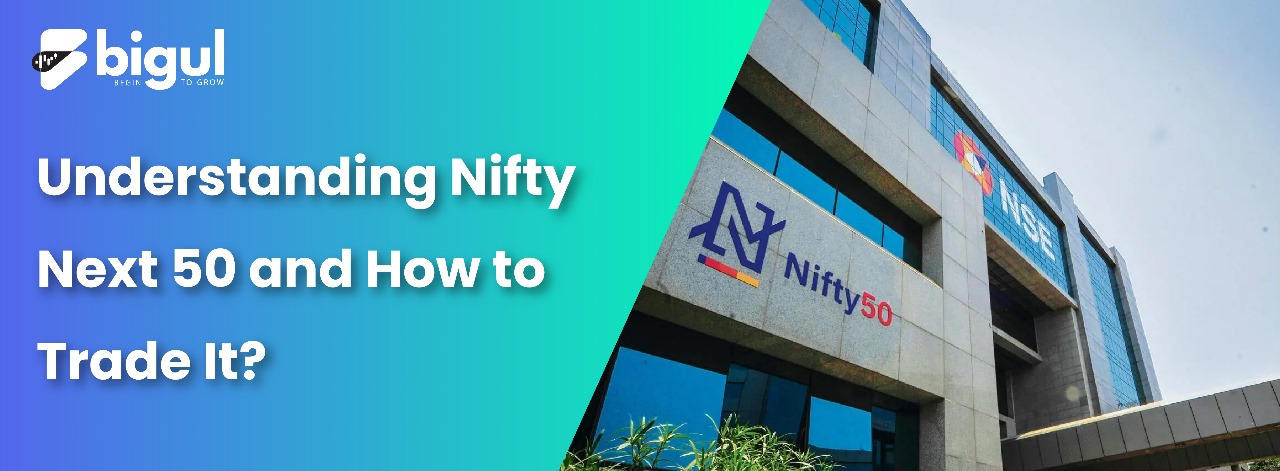In the Indian stock market, where financial opportunities and risks combine, the Nifty Next 50 (NN50) index stands as a hope for growth and diversification. Comprising the fifty companies that follow the Nifty 50 in market capitalisation, NN50 offers a unique perspective on India’s evolving economic landscape. Investors are drawn to NN50’s promise of balanced exposure across sectors and the potential for substantial returns.
However, to understand and use this index, you need a delicate approach. Taking this into account, today we will unlock NN50’s secrets and discuss profitable trading techniques.
What is Nifty Next 50?
Nifty Next 50 (NN50) is an index in the National Stock Exchange (NSE) of India that comprises the 50 companies with the largest market capitalisation after the Nifty 50. NN50 represents a diverse range of sectors and is considered a valuable benchmark for assessing the performance of India’s mid-cap companies. It offers investors an opportunity to diversify their portfolios beyond the top 50 stocks while maintaining a focus on relatively stable, established companies.
Traders and investors often track NN50 for insights into broader market trends and to identify potential growth opportunities.
Benefits of investing in Nifty Next 50
Investing in Nifty Next 50 (NN50) offers several benefits to both active and new investors:
- Diversification:NN50 represents a wide range of sectors, reducing the risk associated with concentrated investments. By holding NN50 stocks, investors can spread their risk across various industries, enhancing portfolio diversification.
- Growth Potential:NN50 includes companies that have the potential for substantial growth. These are often considered emerging leaders in their respective sectors, providing investors with exposure to India’s promising growth stories.
- Balanced Exposure:NN50 strikes a balance between mid-cap and large-cap stocks. This blend provides investors with exposure to companies with established track records (large-cap) and those with higher growth potential (mid-cap).
- Reduced Volatility: While mid-cap stocks can be more volatile individually, the diversified nature of NN50 helps mitigate this volatility. It can offer a smoother investment experience compared to investing in individual mid-cap stocks.
- Liquidity:NN50 stocks are generally more liquid than smaller companies’ stocks, making it easier to buy and sell shares without causing significant price fluctuations. This liquidity enhances trading efficiency.
Investing in NN50 can be an attractive option for those seeking a balanced and diversified exposure to the Indian stock market, with the potential for both capital appreciation and reduced risk compared to individual mid-cap stocks.
How to Trade in Nifty Next 50
Trading in Nifty Next 50 requires careful planning, analysis, and a well-thought-out strategy. Here’s a step-by-step guide on how to trade in NN50:
- Educate Yourself
Before trading in Nifty Next 50 (NN50), it’s vital to grasp the fundamentals of stock market operations. This includes understanding stock analysis methods, like technical and fundamental analysis, and mastering risk management techniques. A solid educational foundation will empower you to make informed decisions, navigate market volatility, and develop effective trading strategies tailored to your financial goals and risk tolerance. Education is the cornerstone of successful NN50 trading.
- Choose a Reliable Broker
Selecting a reputable stockbroker is pivotal when trading in Nifty Next 50 (NN50). Look for a broker with a solid track record, competitive fees, and a user-friendly trading platform. Ensure they offer access to real-time market data and research tools. The choice of broker can significantly impact your trading experience, so take your time to research and select one that aligns with your trading needs and objectives.
- Open a Trading Account
Once you choose the broker, the next step is to open an account. Start by selecting a reputable brokerage firm such as Bigul that offers NN50 trading services. Follow their account opening procedure, which typically involves submitting personal information and financial details and completing any required paperwork. Once your account is established, you can fund it by depositing the amount of capital you’re comfortable trading with. This funding provides you with the necessary resources to initiate and manage your NN50 trades through the broker’s platform, making it an essential prerequisite for participation in the market.
- Choose Your Trading Strategy
Your strategy should align with your financial goals, risk tolerance, and available time commitment. For instance, day trading involves making quick, intraday trades, while swing trading focuses on holding positions for days or weeks. Long-term investing, on the other hand, entails holding NN50 stocks for an extended period. Understanding your chosen strategy and adhering to it diligently will help you make informed decisions, manage risk effectively, and optimise your trading outcomes in the NN50 market.
- Technical Analysis
Technical Analysis involves using tools and indicators to make trading decisions based on historical price and volume data. Traders analyse charts, patterns, and key levels (like support and resistance) to identify suitable entry and exit points for NN50 stocks. Technical analysis helps traders gauge market sentiment and anticipate potential price movements. It’s a vital component of trading strategies, allowing traders to make informed decisions by interpreting the patterns and trends in NN50 stock prices, aiding in maximising profit and minimising losses.
- Risk Management
Risk management is a critical aspect of trading in Nifty Next 50. Setting stop-loss orders is essential to limit potential losses. A stop-loss order is a predetermined price level at which you’re willing to sell a stock to prevent further losses. By defining your risk tolerance and adhering to stop-loss levels, you ensure that a losing trade won’t deplete your capital excessively. It’s a safeguard that helps protect your investments and maintain financial discipline, crucial for long-term success in NN50 trading.
- Diversification
Diversification is the practice of spreading your investments across various stocks within the Nifty Next 50 index. By doing so, you reduce the risk associated with a single stock or sector’s performance. Diversification helps safeguard your portfolio from substantial losses if one stock underperforms. It promotes a balanced risk-reward ratio, enhancing the stability of your overall investment. However, it’s important to strike a balance, as excessive diversification can dilute potential gains. Carefully select a mix of NN50 stocks from different sectors to achieve an optimal risk diversification strategy.
- Start Small
Starting small is a prudent approach to trading in the Nifty Next 50 (NN50). By initially investing a modest amount of capital, you reduce the risk associated with trading and allow yourself to gain valuable experience without exposing yourself to significant losses. This approach enables you to learn the dynamics of NN50, refine your trading strategy, and build confidence gradually. As you become more proficient and achieve consistent results, you can consider increasing your investments, all while minimising the impact of potential losses during the learning curve.
Risks and Challenges You Should Consider
While the Nifty Next 50 index presents great opportunities, it is essential to navigate the potential risks and challenges that come with trading in this market segment. Understanding these factors is crucial for making informed investment decisions.
Volatility in NN50
NN50 is inherently subject to volatility due to various factors. Market fluctuations are common, with stock prices within the index prone to swift and sometimes unpredictable changes. Liquidity issues can arise, majorly in mid-cap stocks within NN50, making it difficult to execute substantial trades without impacting prices significantly. This volatility can be both an opportunity and a risk for traders, requiring them to carefully assess their risk tolerance and adopt appropriate strategies to manage the inherent fluctuations within the NN50 index.
External Factors Affecting NN50
External factors can significantly impact the performance of the Nifty Next 50 (NN50) index. These factors include:
- Economic Conditions:NN50’s fortunes are closely tied to India’s economic health, influenced by variables like GDP growth, inflation rates, and fiscal policies.
- Global Events:NN50 is not insulated from global economic events and geopolitical developments, which can cause shifts in investor sentiment and capital flows, affecting its performance.
Remaining vigilant to these external factors is essential for NN50 investors, as they can quickly influence the index’s trajectory and individual stock prices.
Regulatory Changes and Implications
Regulatory shifts in India’s financial landscape, such as alterations in taxation policies or foreign investment regulations, can exert significant influence on NN50’s constituent companies. These changes may affect the profitability, competitiveness, and overall performance of NN50 stocks.
Furthermore, companies within NN50 must contend with the challenge of staying compliant with evolving governance standards and regulations, which can potentially impact their operations and market value.
As such, traders and investors need to remain vigilant and adapt to these regulatory dynamics to make informed decisions in NN50 trading.
Conclusion
Nifty Next 50 offers a captivating avenue for both experienced and new traders to explore the dynamic world of the Indian stock market. Its diverse composition and historical performance make it an attractive option, but not without its risks. By using smart trading methods, tools, and risk management, traders may maximise NN50’s potential. Remember, successful NN50 trading requires a blend of knowledge, discipline, and adaptability, making it an exciting but challenging endeavour in the realm of stock market investments.








.jpg)
.jpg)
